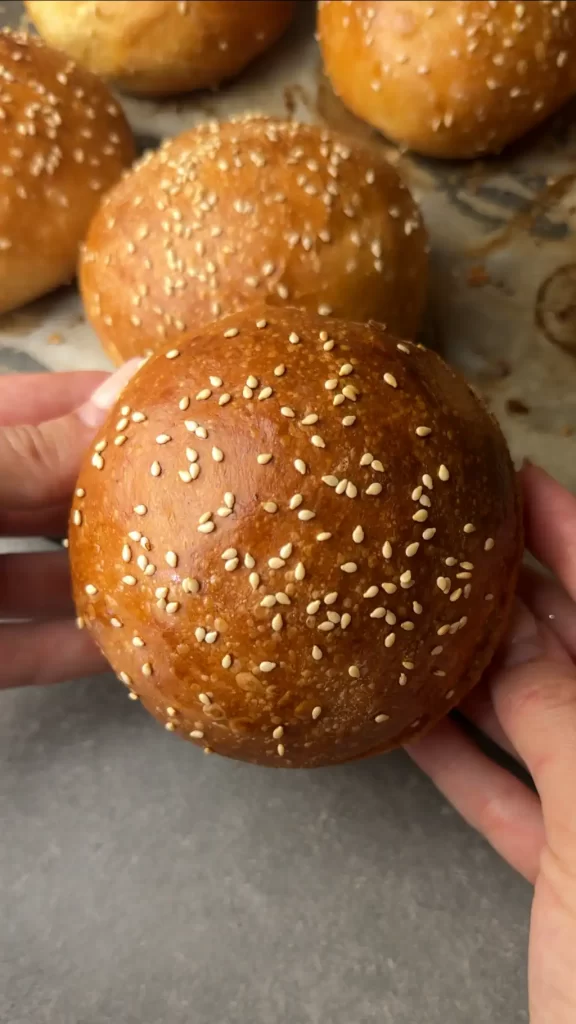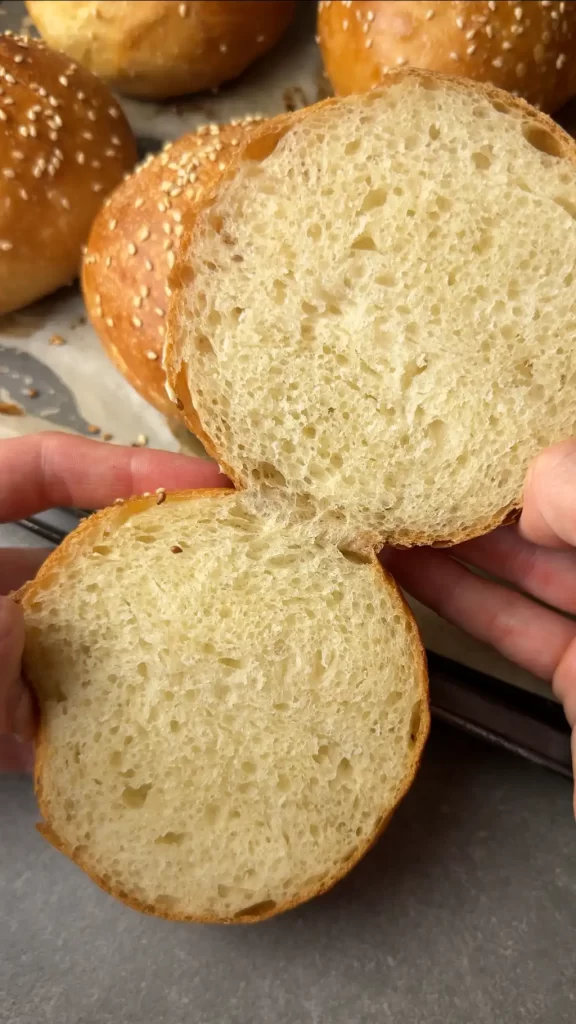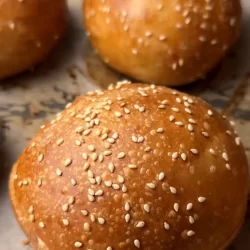Last updated: 23 March 2025
Fluffy, golden, and infused with a delightful sourdough tang, these homemade sourdough hamburger buns are a game-changer for your burger nights. They promise unbeatable freshness and flavour, whether stacked high with your favourite burger toppings or simply slathered with butter. Ready to make your kitchen smell like a bakery? Let’s dive in!

Why You’ll Love This Recipe
- Fluffy and Soft: These buns are all about pillowy softness without the tang some might expect from sourdough—perfect for a crowd-pleasing burger night.
- Gut-Friendly Goodness: Using a sourdough starter instead of commercial yeast means these buns are naturally easier to digest and packed with microbial benefits.
- No Yeast? No Problem! If you’re moving away from baking with yeast (like I am), this recipe is a great way to explore how versatile a sourdough starter can be. I’ve been diving deep into sourdough, figuring out how to make everything from sandwich bread to fluffy buns, and these are a winner!
- Homemade Charm: There’s something so satisfying about baking bread, especially when the result is this delicious and fresh.
Ingredients and Substitutions
Grab all your ingredients! View the recipe card below for a full list of all the ingredients and measurements.
Dough
- Flour: The backbone of the sourdough hamburger buns! Use bread flour for the best texture.
- Substitute: All-purpose flour can work but may need slight hydration adjustments. As long as your flour is at least 11.4% protein.
- Water and Milk: A blend keeps the buns soft and moist.
- Substitute: Use plant-based milk for a dairy-free option.
- Sugar: Adds a hint of sweetness and supports fermentation.
- Salt: Balances the flavours.
- Butter: Gives richness and a tender crumb.
- Substitute: Use margarine or a plant-based alternative for a vegan-friendly version.
- Sourdough Starter: The star ingredient for that unique tang.
- Tip: Ensure your starter is active and bubbly for the best results.
Egg Wash
- Egg and Milk: Create a glossy finish.
- Substitute: Use plant milk or skip for a matte finish.
Optional Topping
- Sesame Seeds: Add crunch and a nutty flavour.
- Variation: Use poppy seeds, or nigella seeds, or leave them plain.


Soft Sourdough Hamburger Buns
Ingredients
Buns
- 420 g bread flour 3 1/3 cups
- 140 g water 2/3 cup
- 140 g milk 2/3 cup
- 20 g sugar 1 1/2 tbsp
- 7 g salt 1 1/4 tsp
- 60 g butter (room temperature) 1/4 cup + 2 tbsp
- 80 g sourdough starter, active and bubbly 1/3 cup + 1 tbsp
Egg wash
- 1 egg
- 1 tbsp milk
Optional Topping
- Sesame seeds
Instructions
Feed Your Sourdough Starter
- Timing: Feed your starter the night before (if baking in the morning) or the morning of baking (if mixing dough in the evening).
- Use a 1:3:3 ratio (starter:water:flour) in cooler environments (below 21°C/70°F), or a 1:4:4 ratio in warmer environments (25–27°C/77–81°F).
- Let the starter ferment at room temperature until doubles (preferably triples) in size, is bubbly, and passes the float test (a spoonful of starter floats in water).
Mix the Dough
- In a large mixing bowl or the bowl of a stand mixer, combine the following:
- Flour, water, milk, sugar, and salt.
- Add 80 g of the active sourdough starter.
- Mix until no dry spots remain. The dough will be slightly sticky but cohesive.
- Cover the bowl with plastic wrap or a damp cloth and let it rest for 20 minutes to allow the flour to hydrate (autolyse phase).
Knead the Dough
- Knead the dough briefly to smooth out its texture.
- By Stand Mixer: Use the dough hook and knead on low speed for 2 minutes.
- By Hand: Knead on a clean surface for about 4 minutes, until the dough becomes stronger and smooth.
Incorporate the Butter
- Gradually add the softened butter:
- By Stand Mixer: Add small cubes of butter, one at a time, while mixing on low speed. Ensure each cube is fully incorporated before adding the next.
- By Hand: Spread a portion of the butter onto the dough and knead it in completely. Repeat until all butter is incorporated.
- Knead for about 10 minutes (stand mixer or by hand) until the dough becomes smooth, elastic, and passes the windowpane test.
Bulk Fermentation (First Rise)
- Lightly oil the dough and place it back into the bowl. Cover with plastic wrap or a damp cloth.
- Allow the dough to ferment:
- Overnight in the fridge for better flavour, or
- 4-6 hours at room temperature, until doubled in size and puffy.
- To test readiness, press your finger into the dough. If the indentation springs back slowly and partially, it’s ready.
Shape the Buns
- Turn the dough onto a clean, lightly floured surface.
- Gently flatten it into a rectangle to release large air pockets.
- Divide the dough into 8 equal portions (approximately 100g each).
Shape each bun:
- Stretch and fold the edges toward the centre to form a taut surface.
- Flip the dough so the smooth side faces up, then rotate and tighten the surface by cupping your hand around the dough and pulling it towards you on the counter. Here is a video showing this.
- Place shaped buns on a lined baking tray, leaving at least 1 inch of space between them.
Second Rise (Proofing)
- Cover the buns loosely with lightly oiled plastic wrap to prevent sticking.
- Let them rise at room temperature for 1-4 hours, or until doubled in size.
- Perform the poke test: Press a finger gently into a bun. If the indentation springs back slowly and partially, they’re ready.
Preheat and Egg Wash
- Preheat your oven to:
- 180°C (356°F) with fan, or
- 190°C (375°F) without fan.
- Whisk together 1 egg and 1 tablespoon of milk for the egg wash.
- Brush the egg wash gently over the tops of the buns. Sprinkle with sesame seeds, if desired.
Bake
- Bake the buns on the middle rack for 15–20 minutes, rotating the tray halfway through for even browning.
- The buns are done when they are golden brown and sound hollow when tapped on the bottom.
- Remove from the oven and transfer to a wire rack to cool completely before slicing or serving.
Serve or Store
- Enjoy the buns fresh on the same day or store them:
- In an airtight container/ butchers bag at room temperature for 2–3 days.
- Freeze for up to 3 months. Thaw and reheat before serving.
Video
Notes
- A strong starter is essential – it needs to double or triple in size at least.
- Adding the butter by hand is more challenging but totally doable, spread a cube or two in a layer over the top and fold the dough over, and knead until completely absorbed, then do the next bit.
Frequently Asked Questions
Are these sourdough hamburger buns tangy like sourdough bread?
Not at all! These sourdough buns are soft and fluffy without the tangy flavour some associate with sourdough bread. They’re perfect for those who want the benefits of sourdough without the pronounced taste.
Why are these sourdough hamburger buns gut-friendly?
Sourdough fermentation breaks down gluten and other compounds in the dough, making it easier to digest. Plus, the natural microbes in a sourdough starter contribute to a healthier gut.
What if I usually bake with yeast?
This recipe is a fantastic introduction to baking without commercial yeast! If you’re like me and transitioning into sourdough baking, these buns are an easy and rewarding place to start.
Can I use this recipe for other bread types?
Absolutely! Once you master these buns, you can adapt the method for rolls, sandwich bread, or even dinner rolls. Speaking of which, check out my recipe for vegan sourdough sandwich bread for another way to expand your sourdough repertoire.

